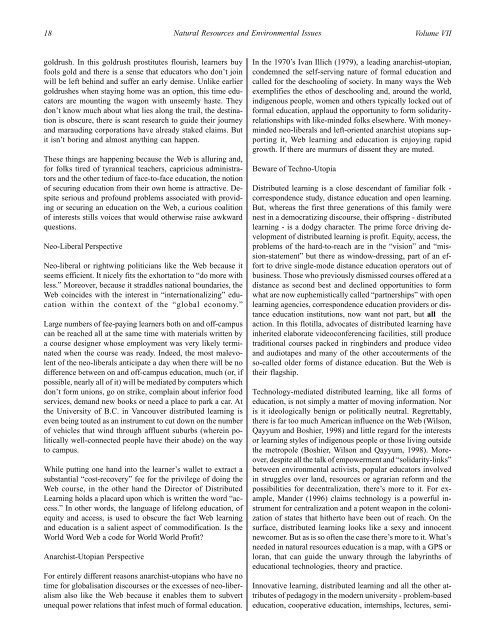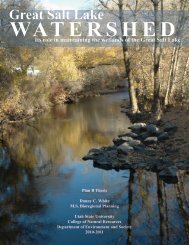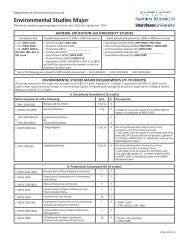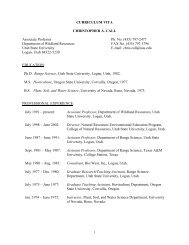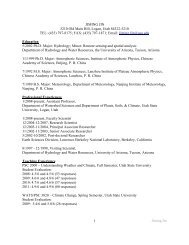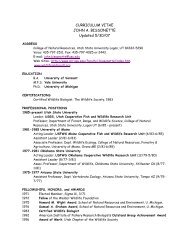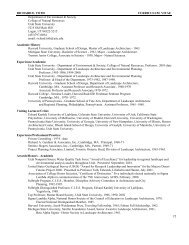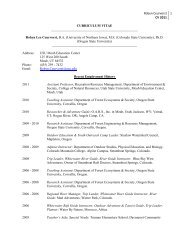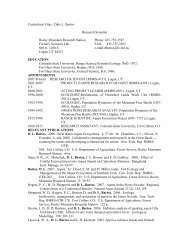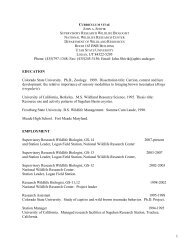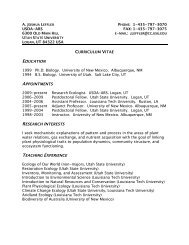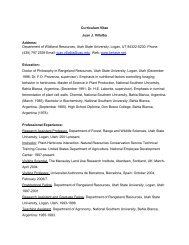University Education in Natural Resources - CNR Home - Utah State ...
University Education in Natural Resources - CNR Home - Utah State ...
University Education in Natural Resources - CNR Home - Utah State ...
You also want an ePaper? Increase the reach of your titles
YUMPU automatically turns print PDFs into web optimized ePapers that Google loves.
18 <strong>Natural</strong> <strong>Resources</strong> and Environmental Issues Volume VII<br />
goldrush. In this goldrush prostitutes flourish, learners buy<br />
fools gold and there is a sense that educators who don’t jo<strong>in</strong><br />
will be left beh<strong>in</strong>d and suffer an early demise. Unlike earlier<br />
goldrushes when stay<strong>in</strong>g home was an option, this time educators<br />
are mount<strong>in</strong>g the wagon with unseemly haste. They<br />
don’t know much about what lies along the trail, the dest<strong>in</strong>ation<br />
is obscure, there is scant research to guide their journey<br />
and maraud<strong>in</strong>g corporations have already staked claims. But<br />
it isn’t bor<strong>in</strong>g and almost anyth<strong>in</strong>g can happen.<br />
These th<strong>in</strong>gs are happen<strong>in</strong>g because the Web is allur<strong>in</strong>g and,<br />
for folks tired of tyrannical teachers, capricious adm<strong>in</strong>istrators<br />
and the other tedium of face-to-face education, the notion<br />
of secur<strong>in</strong>g education from their own home is attractive. Despite<br />
serious and profound problems associated with provid<strong>in</strong>g<br />
or secur<strong>in</strong>g an education on the Web, a curious coalition<br />
of <strong>in</strong>terests stills voices that would otherwise raise awkward<br />
questions.<br />
Neo-Liberal Perspective<br />
Neo-liberal or rightw<strong>in</strong>g politicians like the Web because it<br />
seems efficient. It nicely fits the exhortation to “do more with<br />
less.” Moreover, because it straddles national boundaries, the<br />
Web co<strong>in</strong>cides with the <strong>in</strong>terest <strong>in</strong> “<strong>in</strong>ternationaliz<strong>in</strong>g” education<br />
with<strong>in</strong> the context of the “global economy.”<br />
Large numbers of fee-pay<strong>in</strong>g learners both on and off-campus<br />
can be reached all at the same time with materials written by<br />
a course designer whose employment was very likely term<strong>in</strong>ated<br />
when the course was ready. Indeed, the most malevolent<br />
of the neo-liberals anticipate a day when there will be no<br />
difference between on and off-campus education, much (or, if<br />
possible, nearly all of it) will be mediated by computers which<br />
don’t form unions, go on strike, compla<strong>in</strong> about <strong>in</strong>ferior food<br />
services, demand new books or need a place to park a car. At<br />
the <strong>University</strong> of B.C. <strong>in</strong> Vancouver distributed learn<strong>in</strong>g is<br />
even be<strong>in</strong>g touted as an <strong>in</strong>strument to cut down on the number<br />
of vehicles that w<strong>in</strong>d through affluent suburbs (where<strong>in</strong> politically<br />
well-connected people have their abode) on the way<br />
to campus.<br />
While putt<strong>in</strong>g one hand <strong>in</strong>to the learner’s wallet to extract a<br />
substantial “cost-recovery” fee for the privilege of do<strong>in</strong>g the<br />
Web course, <strong>in</strong> the other hand the Director of Distributed<br />
Learn<strong>in</strong>g holds a placard upon which is written the word “access.”<br />
In other words, the language of lifelong education, of<br />
equity and access, is used to obscure the fact Web learn<strong>in</strong>g<br />
and education is a salient aspect of commodification. Is the<br />
World Word Web a code for World World Profit?<br />
Anarchist-Utopian Perspective<br />
For entirely different reasons anarchist-utopians who have no<br />
time for globalisation discourses or the excesses of neo-liberalism<br />
also like the Web because it enables them to subvert<br />
unequal power relations that <strong>in</strong>fest much of formal education.<br />
In the 1970’s Ivan Illich (1979), a lead<strong>in</strong>g anarchist-utopian,<br />
condemned the self-serv<strong>in</strong>g nature of formal education and<br />
called for the deschool<strong>in</strong>g of society. In many ways the Web<br />
exemplifies the ethos of deschool<strong>in</strong>g and, around the world,<br />
<strong>in</strong>digenous people, women and others typically locked out of<br />
formal education, applaud the opportunity to form solidarityrelationships<br />
with like-m<strong>in</strong>ded folks elsewhere. With moneym<strong>in</strong>ded<br />
neo-liberals and left-oriented anarchist utopians support<strong>in</strong>g<br />
it, Web learn<strong>in</strong>g and education is enjoy<strong>in</strong>g rapid<br />
growth. If there are murmurs of dissent they are muted.<br />
Beware of Techno-Utopia<br />
Distributed learn<strong>in</strong>g is a close descendant of familiar folk -<br />
correspondence study, distance education and open learn<strong>in</strong>g.<br />
But, whereas the first three generations of this family were<br />
nest <strong>in</strong> a democratiz<strong>in</strong>g discourse, their offspr<strong>in</strong>g - distributed<br />
learn<strong>in</strong>g - is a dodgy character. The prime force driv<strong>in</strong>g development<br />
of distributed learn<strong>in</strong>g is profit. Equity, access, the<br />
problems of the hard-to-reach are <strong>in</strong> the “vision” and “mission-statement”<br />
but there as w<strong>in</strong>dow-dress<strong>in</strong>g, part of an effort<br />
to drive s<strong>in</strong>gle-mode distance education operators out of<br />
bus<strong>in</strong>ess. Those who previously dismissed courses offered at a<br />
distance as second best and decl<strong>in</strong>ed opportunities to form<br />
what are now euphemistically called “partnerships” with open<br />
learn<strong>in</strong>g agencies, correspondence education providers or distance<br />
education <strong>in</strong>stitutions, now want not part, but all the<br />
action. In this flotilla, advocates of distributed learn<strong>in</strong>g have<br />
<strong>in</strong>herited elaborate videoconferenc<strong>in</strong>g facilities, still produce<br />
traditional courses packed <strong>in</strong> r<strong>in</strong>gb<strong>in</strong>ders and produce video<br />
and audiotapes and many of the other accouterments of the<br />
so-called older forms of distance education. But the Web is<br />
their flagship.<br />
Technology-mediated distributed learn<strong>in</strong>g, like all forms of<br />
education, is not simply a matter of mov<strong>in</strong>g <strong>in</strong>formation. Nor<br />
is it ideologically benign or politically neutral. Regrettably,<br />
there is far too much American <strong>in</strong>fluence on the Web (Wilson,<br />
Qayyum and Boshier, 1998) and little regard for the <strong>in</strong>terests<br />
or learn<strong>in</strong>g styles of <strong>in</strong>digenous people or those liv<strong>in</strong>g outside<br />
the metropole (Boshier, Wilson and Qayyum, 1998). Moreover,<br />
despite all the talk of empowerment and “solidarity-l<strong>in</strong>ks”<br />
between environmental activists, popular educators <strong>in</strong>volved<br />
<strong>in</strong> struggles over land, resources or agrarian reform and the<br />
possibilities for decentralization, there’s more to it. For example,<br />
Mander (1996) claims technology is a powerful <strong>in</strong>strument<br />
for centralization and a potent weapon <strong>in</strong> the colonization<br />
of states that hitherto have been out of reach. On the<br />
surface, distributed learn<strong>in</strong>g looks like a sexy and <strong>in</strong>nocent<br />
newcomer. But as is so often the case there’s more to it. What’s<br />
needed <strong>in</strong> natural resources education is a map, with a GPS or<br />
loran, that can guide the unwary through the labyr<strong>in</strong>ths of<br />
educational technologies, theory and practice.<br />
Innovative learn<strong>in</strong>g, distributed learn<strong>in</strong>g and all the other attributes<br />
of pedagogy <strong>in</strong> the modern university - problem-based<br />
education, cooperative education, <strong>in</strong>ternships, lectures, semi-


